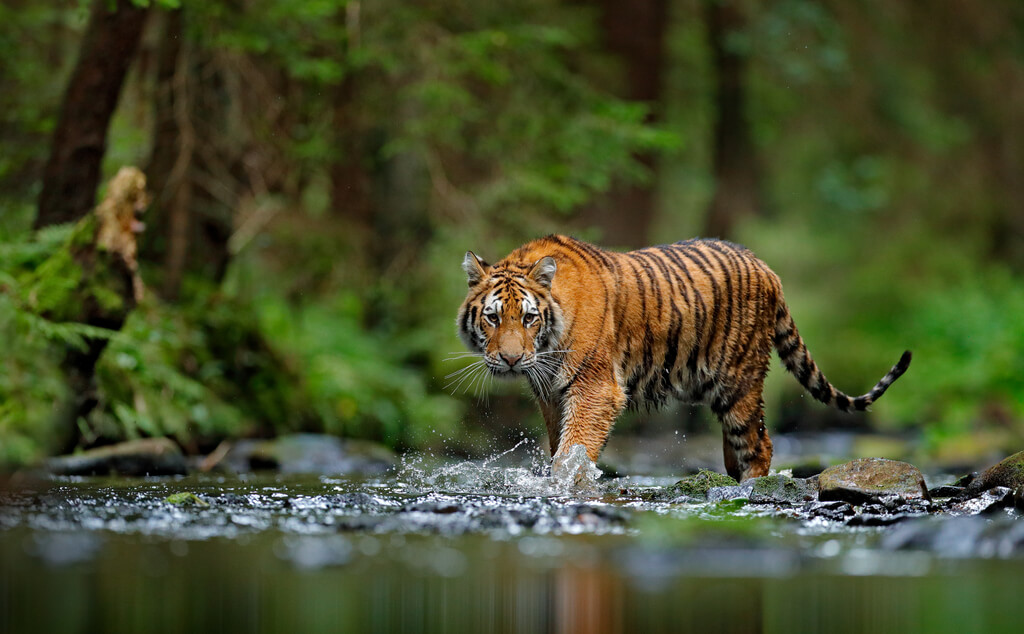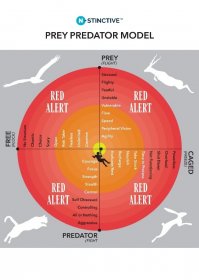Use The Ultimate Business Toolkit From The Natural World To Improve Your Projects

As a project manager and/or business owner you need to keep enhancing your skills. Self-awareness and inter-personal skills are essential for effective team relationships and for developing your career or your business.
Imagine if you could improve your skills and also create lasting transformation for you and your team. How would that be?
I believe this is possible simply by using nature’s own processes as a roadmap. I advocate learning how we can mirror, in our own lives, the lessons that the natural world teaches us.
In order to help you do this let me review six ‘navigational tools’ inspired by the natural world.
NAVIGATIONAL TOOL 1 – “The Prey Predator Model”
Nature, by its own definition, is forced to adapt to unexpected changes in order to thrive. It is also designed to harness maximum productivity whilst minimising energy loss.
In business terms nature seeks the maximum return on investment (ROI) on its energy use versus its productivity. As leaders we can learn from this natural process.
The N-stinctive PREY PREDATOR MODELTM is a diagnostic tool and highly adaptive concept that can be tailored to any audience. I invite you to spend 5 minutes looking at the model below and ask yourself two questions:
- Whilst trying to take into account both your project management and personal lives, if you were to select one word from each ‘branch’ of the model that most accurately depicts your current state, where do you fit right now?
- Then, whilst looking into the near future, to achieve your immediate goals in life and business, where do you want to be?
Hopefully, simply by taking a moment of introspection, you can begin to create a personal roadmap towards a more successful future. The remaining ‘navigational tools’ in this article are designed to help you get there, using nature as your guide.

NAVIGATIONAL TOOL 2 – “Stability”
Let nature anchor you in the eye of this storm. The time of COVID-19 and lockdown will pass. Stay steady. Trust. Accept that we don’t have all the answers, but we as a species we will endure and overcome.
Consider that penguins throughout the Antarctic are forced into a situation of lockdown for their survival – every year! Their natural cycle is to maximise energy intake in the easier times, foreseeing the challenging months ahead with a well-designed project plan for survival.
Let’s not forget as well, that penguins survive their harsh winters by huddling together in unity and support. Those animals on the outside who brunt the biting winds are quickly rotated back into the middle of the pack to make sure that no individual alone has to bear all of the burden.
A lesson we could all learn through these hard times; the challenges don’t last forever and together we can bear the brunt of the worst of it for the benefit of all.
NAVIGATIONAL TOOL 3 – “Connection”
Nature has an incredible ability to restore the human spirit. If we ignore it and continue to believe that manmade solutions will supplement our connection to the wildlife, we are deluded.
We are not IN nature, we ARE nature.
Nature connects us to the present moment. It makes us savour the here and now, instead of always striving for the goals of tomorrow. With the constant presence of nature outside our window we can feel connected to something bigger than ourselves, something timeless, endless, out of our control.
There are plenty of ways to re-connect with nature – even if you live or work in a high-rise in the city.
For example, bring plants into your house or office; on your walk to work notice the birds and their song; take a detour through the local park on your way home; go somewhere in nature you haven’t been before; watch documentaries about the natural world; add a beautiful landscape view to your screen saver; support (perhaps with a fundraising event in the office) a nature charity; visit your local nature reserve.
NAVIGATIONAL TOOL 4 – “Courage”
Think of the hatchling that flings itself off a mountaintop with the hope that it will fly. This tacit knowledge is passed down through generations. The young bird doesn’t need to be told it can fly, or taught how to fly, it just has the courage to leap with inherent confidence that everything will be ok.
Animals in the wild wake up in the morning to face far more daunting challenges than we do. They have to find food and water to stay alive.
Thanks to the legendary television programmes and films from David Attenborough and other wildlife experts, we can see the tremendous courage of animals defending their territory, their food, their young, and their mates from what seems like a certain death.
We only need to look at nature to be inspired by those qualities and to understand the hugely motivational stories of animals adapting to new circumstances and surviving despite severe famine, environmental disaster, drought, bushfire, tsunami, loss of habitat, migration and man’s destruction.
Wouldn’t it be wonderful if we could learn from nature in this way, and have the courage to trust our natural instincts more often, instead of always seeking external validation?
NAVIGATIONAL TOOL 5 – “Creativity”
Harnessing creativity to gain an advantage over your competitors – or to add cohesion to a team – is a very powerful tool. We all know the phrase “thinking outside the box” – that is, to come up with an imaginative solution to a current situation.
Well, there are hundreds of examples of this throughout the natural world. Male birds of paradise that have to ‘dance off’ against other males with ever increasingly extravagant moves in order to obtain a mate.
Or the Japanese pufferfish that creates incredible artwork in the sand. Or the harvest mice that sleep cuddled up inside flowers for mutual protection from predators.
We can all look to nature, and seek our inner creativity, to find imaginative solutions to our challenges at home and at work. Finding the strengths within yourself and those around you (be it art, music, dance, comedy…) can be a brilliant way to solidify your teams and colleagues into a tighter unit. There are no rules here!
NAVIGATIONAL TOOL 6 – “Confidence”
Confidence is about having belief in your own innate ability. It is not static; it evolves over time depending on your experiences.
For example, we may be uncertain about facing a new challenge, perhaps a particularly complex project, but once overcome, we realise that the hurdle wasn’t so high after all, giving us confidence to repeat the process next time.
What is extraordinary about animals is that they never doubt their personal power, not for a moment. Google search “climbing mountain goat”.
These animals are able to stand on perceptibly vertical cliffs throughout wind and rainstorms with complete confidence that they won’t plummet into the ravine. This gives them a habitat free from predators that cannot hunt on the sheer slopes. Their confidence is key to their survival.
How does this relate to you? Well, use the analogy to remind yourself in future times of uncertainty that your ability to overcome challenges is not all about your physical attributes (strength, qualifications, experience) but just as much about having confidence in your own abilities to see it through.
These navigational tools, provided by the natural world, can be used to help us improve our own self-awareness and in turn, lead to a positive transformation for our teams, our projects and our businesses overall.
Rosie Tomkins is founder of the Natural Capital Consultancy and author of ‘N-stinctive’, an inspirational book that introduces an alternative to traditional leadership training by unlocking the power of the natural world to provide strength and confidence to people who are shouldering huge responsibility.
Rosie’s clients include the GB Olympic hockey and England rugby teams, the NHS and multi-national companies in the airline, engineering and pharmaceutical industries.




